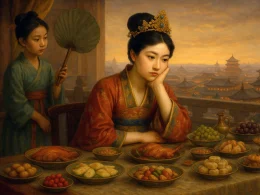While the year sinks westward, I hear a cicada
Bid me to be resolute here in my cell,
Yet it needed the song of those black wings
To break a white-haired prisoner's heart....
His flight is heavy through the fog,
His pure voice drowns in the windy world.
Who knows if he be singing still? - -
Who listens any more to me?
Original Poem
「在狱咏蝉」
骆宾王
西陆蝉声唱,南冠客思侵。
不堪玄鬓影,来对白头吟。
露重飞难进,风多响易沉。
无人信高洁,谁为表予心。
Interpretation
Composed in 678 AD during Emperor Gaozong's reign, this poem was written by Luo Binwang while imprisoned for offending Empress Wu with his frank admonitions. Using the cicada as a metaphor, the poet channels his wrongful persecution and unyielding spirit, aligning the insect's purity with his own moral integrity amidst political darkness.
First Couplet: "西陆蝉声唱,南冠客思侵。"
Xī lù chán shēng chàng, nán guān kè sī qīn.
Autumn cicadas trill their solemn tune; This captive's heart aches beneath the moon.
The opening juxtaposes seasonal soundscape ("autumn cicadas") with human suffering ("captive's heart"). "Southern cap" (南冠) alludes to Zhong Yi, a historical figure imprisoned for loyalty, mirroring Luo's own unjust confinement. The cicada's song becomes both timekeeper and torment—a reminder of freedom lost.
Second Couplet: "不堪玄鬓影,来对白头吟。"
Bùkān xuán bìn yǐng, lái duì báitóu yín.
How can I bear their jet-winged youth, While singing "White Hair" in chains, forsooth?
Here, the cicada's "jet-winged" vitality contrasts with the poet's premature despair ("White Hair Song" references Zhuo Wenjun's lament for betrayed love). The couplet vibrates with dissonance: the insect's summer brilliance underscores the prisoner's wintry exile.
Third Couplet: "露重飞难进,风多响易沉。"
Lù zhòng fēi nán jìn, fēng duō xiǎng yì chén.
Dew weights their wings—no flight retained; Wind drowns their voice—no sound sustained.
The central metaphor crystallizes: "dew" symbolizes oppressive political climate, while "wind" represents slanderous voices. Like the grounded cicada, the poet finds movement and speech impossible—a perfect emblem for silenced dissent in tyrannical times.
Fourth Couplet: "无人信高洁,谁为表予心。"
Wú rén xìn gāo jié, shéi wèi biǎo yǔ xīn.
Who believes their chaste refrain? Who'll vindicate this heart's true strain?
The finale shifts from metaphor to direct plea. The rhetorical questions underscore his isolation—both the cicada's purity and his loyalty are rendered invisible by a cynical world. Yet the very act of writing this poem becomes its own vindication, etching his protest into literary permanence.
Holistic Appreciation
This poem employs the cicada as a metaphor, using its noble autumn song to reflect the poet's unyielding spirit despite imprisonment. Achieving perfect integration of scene and sentiment, the work alternates between depicting cicadas in nature and voicing personal conviction, demonstrating masterful artistic expression. Particularly remarkable is how the imprisoned poet channels his defiance and profound contemplation through cicada imagery. Symbols like "the western cicada's song," "white-haired lament," and "dew-heavy wings falter in flight" create an emotionally charged atmosphere while deepening the poem's allegorical significance. The result is a profoundly meditative work that resonates with solemn cadences and thought-provoking depth.
Artistic Merits
The poem exhibits ingenious conception, using the cicada's purity to symbolize the poet's own integrity, achieving an organic unity between subject and object. Its allusions—such as "southern cap" (referring to prisoners) and "white-haired lament"—are subtly apt, enriching the philosophical undertones. With concise diction, impeccable parallelism, and logically progressing emotion, the work showcases Luo Binwang's exceptional talent as one of the "Four Great Poets of Early Tang," affirming his artistic mastery.
Insights
This poem teaches the importance of upholding one's character and convictions in adversity. By identifying with the cicada—unyielding to hardship and undeterred by slander—the poet powerfully embodies moral integrity. Furthermore, the work poses an enduring challenge: when facing injustice and misunderstanding, can one maintain original principles and uphold righteousness? This constitutes life's ultimate test of character. Though small, the cicada sings unceasingly; though suffering, humans too can preserve their aspirations. The poem thus transforms insect song into a timeless metaphor for human resilience.
Poem translator
Kiang Kanghu
About the poet
Luo Binwang (骆宾王), circa 640 - 684 A.D., was a native of Yiwu, Zhejiang Province, who was able to write poetry at the age of seven. He was one of the “Four Heroes of the Early Tang Dynasty”, together with Wang Bo and other poets and writers. He was one of the “Four Heroes of the Early Tang Dynasty”. His poems were characterized by seven lines of poetry, with many words of grief and anger.












